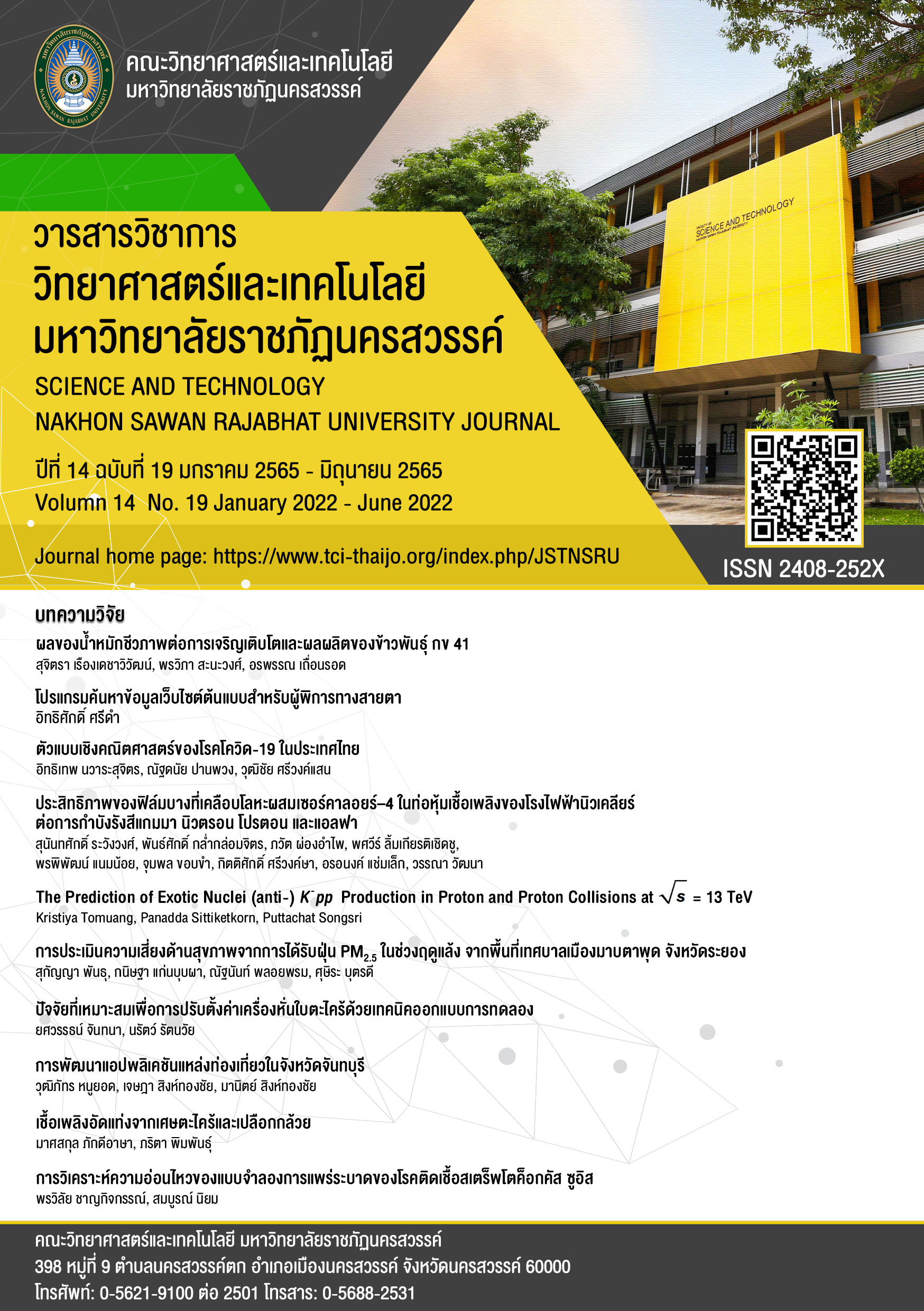The Prediction of Exotic Nuclei (anti-) K^- pp Production in Proton and Proton Collisions at √s = 13 TeV
Keywords:
Exotic nuclei, Kaonic Nuclei, Kaon, Proton, Heavy ionAbstract
The production of and
are predicted by using the Dynamically Constrained Phase space Coalescence (DCPC) model with based on the final staes of the hadron (
,
,
) from PACIAE model at scaled mid-rapidity | y | < 1 and the transverse momentum (
) range of 0.1 - 1.7 GeV/c in proton-proton collisions at
= 13 TeV. The results of charge particle
,
and
are consistent with CMS experimental data. The result of simulation presented that the yield of the
is about
and bigger than their anti (
) according to the hypothesis that these exotic nuclei clusters are constructed in the way that (anti-)kaon directly traps two (anti-)protons, without going through process of the
doorway state.
References
Agnello, M., Beer, G., Benussi, L., Bertani, M., Bianco, S., Botta, E., et al. (2005). Evidence for a kaon-bound state K- pp produced in Kabsorption reactions at rest. Physical Review Letters, 94(21), 5 pages. https://doi.org/10.1103/PhysRevLett.94.212303
Akaishi, Y., & Yamazaki, T. (2002). Nuclear anti-K bound states in light nuclei. Physical Review C. 65(4), 044005. https://doi.org/10.1103/PhysRevC.65.044005
Combridge, B. L., Kripfganz, J., & Ranft, J. (1977). Hadron Production at Large Transverse Momentum and QCD. Physics Letters B, 70, 234-238. https://doi.org/10.1016/0370-2693(77)90528-7
Dote, A., Akaishi, Y., Horiuchi, H., & Yamzaki, T. (1953). Mean calue method in iteration. Proceedings of the American Mathematical Society, 5, 560-570. https://doi.org/ 10.1090/s0002-9939-1953-0054846-3
Dote, A., Hyodo, T., & Weise, W. (2009). Variational calculation of the ppK- system based on chiral SU(3) dynamics. Physical Review C, 79, 18 pages. https://doi.org/10.1103/ PhysRevC.79.014003
Ichikawa, Y., Nagae, T., Fujioka, H., Bhang, H., Bufalino, S., et al. (2015). Observation of the ”K-pp”-like structure in the d( , K+) reaction at 1.69 GeV/c. Progress of Theoretical and Experimental Physics, 2015(2), 8 pages. https://doi.org/10.1093/ptep/ptv002
Kezerashvili, R. Y., & Tsiklauri, S. M. (2014) Investigation of the structure of the few body kaonic nuclei using the method of hyperspherical functions in momentum space. Proceedings, 13th International Workshop on Meson Production, Properties and Interaction, 81, 5 pages. https://doi.org/10.1051/epjconf/20148102022
Nishikawa, T., & Kondo, Y. (2008) K-pp bound states from Skyrmions. Physical Review C, 77, 15 pages. https://doi.org/10.1103/PhysRevC.77.055202
Sada, Y., Ajimura, S., Bazzi, M., Beer, G., Bhang, H., Bragadireanu, M., et al. (2016). Structure near K-+p+p threshold in the in-flight 3He(K-, )n reaction. Progress of Theoretical and Experimental Physics, 2016(5), 11 pages. https://doi.org/10.1093/ptep/ptw040
Sjostrand, T. (1994). High-energy physics event generation with PYTHIA 5.7 and JETSET 7.4. Computer Physics Communications, 82(1), 74-89. https://doi.org/10.1016/0010-4655(94)90132-5
Sjostrand, T., Mrenna, S., & Skands, P. Z. (2006) PYTHIA 6.4 Physics and Manual. Nonlinear Anal, 32, 447–454.
Sirunyan, A. M., Tumasyan, A., Adam, W., Asilar, E., Bergauer, T., Brandstetter, J., et al. (2017). Measurement of charged pion, kaon, and proton production in proton-proton collisions at = 13 TeV. Physical Review D, 96, 112003. https://doi.org/10.1103/PhysRevD.96.112003
Yamazaki, T., & Akaishi, Y. (2002). (K-, pi-) production of nuclear anti-K bound states in proton-rich systems via Lambda* doorways. Physics Letters B, 535(1-4), 70-76, https://doi.org/ 10.1016/ S0370-2693(02)01738-0
Yamazaki, T., & Akaishi, Y. (2007). The Basic anti-K nuclear cluster K- pp and its enhanced formation in the p + p —> K+ + X reaction. Physical Review C, 76, 18 pages.
https://doi.org/10.1103/PhysRevC.76.045201
Yamazaki, T., & Akaishi, Y. (2007). Super strong nuclear force caused by migrating anti-K mesons: Revival of the Heitler-London-Heisenberg scheme in kaonic nuclear clusters. Proceeding of the Japan Academy, Ser. B, Physical and Biological Sciences, 83, 144-150. https://doi.org/10.2183/pjab.83.144
Yamazaki, T., Maggiora, M., Kienle, P., Suzuki, K., Amoroso, A., Alexeev, M., et al. (2010). Indication of a deeply bound compact K-pp state formed in the pp -> p Lambda K+ reaction at 2.85 GeV. Physical Review Letters, 104, 5 pages. https://doi.org/10.1103/ PhysRevLett.104.132502
Yan, Y. L., Zhou, D. M., Dong, B. G., Li, X. M., Ma, H. L. and Sa, B. H. (2010) Centrality dependence of forward-backward multiplicity correlation in Au+Au collisions at = 200 GeV. Physical Review C, 81(4). 6 pages. https://doi.org/10.1103/PhysRevC.81.044914
Downloads
Published
Issue
Section
License
Copyright (c) 2022 SCIENCE AND TECHNOLOGY NAKHON SAWAN RAJABHAT UNIVERSITY JOURNAL

This work is licensed under a Creative Commons Attribution-NonCommercial-NoDerivatives 4.0 International License.



